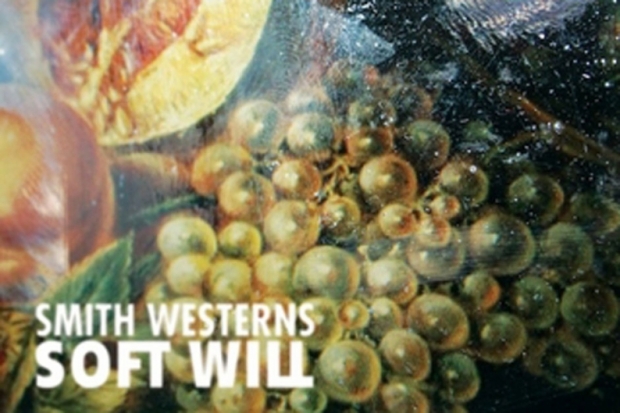The Smith Westerns - Soft Will

"Every day's a blessing, every day's a hangover," coos Smith Westerns frontman Cullen Omori in the song "Idol." The line is less poetic device and more literal commentary for a bunch of midwest prep-schoolers turned Indie-dears raised on beers, blunts, and video games. But the Smith Westerns' languid lifestyle is afforded by their prodigiously keen ears which grasp musical concepts with chalkboard ease. Since Cullen enlisted classmate and guitarist Max Kakacek in 2007, roping in his younger brother Cameron Omori to play bass and drummer Hal James (later replaced by Unknown Mortal Orchestra's Julien Ehrlich), the band has forged a highly-progressive path from lyrical garage-rockers to a sort of theory-smart, next-gen Shins as the young Chicagoans grow in scope and popularity with each successive album. In early 2009, the band was the albumless opener for Nobunny, returning to the stage after their own set to play backup for the eccentric Tucsonite's prancing theatrics. Their "janky" self-titled debut hit the market that Summer—the same week as junior bandmate Cameron's high-school graduation—and the relative success of its Nuggets-inspired retro-rock and sweet but drowned-out choruses prompted Cullen to leave Northwestern to consolidate efforts with the band.
I don’t want to have crappy grades and be alright at writing music, I’d rather be good at both or be good at one.
All for the better. As the well-documented sophomore album pressure set in, Cullen looked to the Clash for inspiration on how to evolve their sound.
You listen to their first record and it's almost unlistenable. Then you listen further down and it's like, 'Whoa – this is, like, straight-up, really, really poppy, catchy, well-crafted music. I like that.
Well said, Mr. Omori. Lucky for him, the success of Smith Westerns earned his band an ample studio budget for their next record, Dye It Blonde, which with it's cleaned up sound and dreamy balladry charmed a Best New Music badge out of Pitchfork and became the Smith Westerns' pop mainstream break. Released on major indie label Fat Possum in 2011, Dye It Blonde drew upon the charisma of 90s Britpop stars Oasis and Suede (and by pedigree the Kinks and Beatles) and saw the band plugging their melodic instinct into stylishly ho-hum love songs (later justified as a veiled, "tongue-in-cheek...means to talk about other things") and teenage anthems bathed in whimsical studio orchestration.

After nearly two years in the making, Soft Will captures a more nuanced portrait of the band, now in their twenties. The balance issues that still haunted Dye It Blonde were mostly purged from Soft Will, which shows off an impressively tight ensemble and sleek, finely-tuned songs. In "Idol," for example, where the independent voices rhythmically align for quadripartite verses of introspective couplets. At times like these it's as if Cullen is channelling James Mercer's soaring tenor ("White Oath," "Only Natural," "Varsity"), only with less abstruse lyrics. As the Smith Westerns actively diverge from their former reputation as a girl-wooing party band, their subject matter has matured accordingly. Cameron observed: "We’ve become more and more confident in ourselves and we can share more now. When you are older, it’s a lot easier to be personal." Soft Will deals with the experience of returning home, navigating an uncertain social backdrop where old friends are graduating from college, breaking up, or pursuing traditional careers, all the while trying to rediscover one's own social niche. Indeed, sometimes words just can't quite express it; instead, the fully-instrumental "XXIII" transcribes the experience in music, taking an admirable stab at trance-inducing drama that Pink Floyd or the Flaming Lips have championed. Then there's the brooding bass riff and lazy strumming in "Cheer Up," which begs for its own titular advice, showcasing a band whose coming-of-age is intelligently expressed both in words and a visceral musical pathos.
Of course, there's always room for improvement. The Hotel California riff that starts "Glossed" wanders above an awkward bass line and non-intuitive chord shifts. Other times the band relies too much on homophonic textures, resulting in dense harmonies that flatly deny the melodic pull ("Only Natural"). And "Best Friend" is an epic eye-roller. But the band has proven a capacity for steep and consistent musical progress that leaves one to wonder what their next album might sound like. When Alex White of White Mystery and Missile X Records waxed prophetic to the Chicago Reader in 2009, I doubt she envisioned the current fate of her pet band, who at the time was just beginning to raise eyebrows:
"From where [the Smith Westerns' music] was two years ago to where it is now, you listen to it side by side and you can hear a lot of growth and development," says White. "I think it's great that they're kinda growing into their skin."